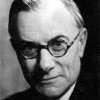Study the historian before you begin to study the facts. This is, after all, not very abstruse. It is what is already done by the intelligent undergraduate who, when recommended to read a work by that great scholar Jones of St. Jude’s, goes round to a friend at St. Jude’s to ask what sort of chap Jones is, and what bees he has in his bonnet. When you read a work of history, always listen out for the buzzing. If you can detect none, either you are tone deaf or your historian is a dull dog. The facts are really not at all like fish on the fishmonger’s slab. They are like fish swimming about in a vast and sometimes inaccessible ocean; and what the historian catches will depend partly on chance, but mainly on what part of the ocean he chooses to fish in and what tackle he chooses to use – these two factors being, of course, determined by the kind of fish he wants to catch. By and large, the historian will get the kind of facts he wants. History means interpretation.
E. H. Carr (1892-1982) British historian, journalist, international relations theorist [Edward Hallett "Ted" Carr]
What Is History?, ch. 1 (1961)
(Source)

